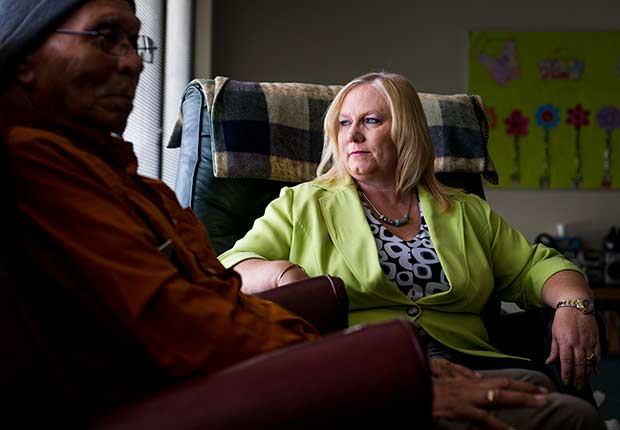AARP Hearing Center

By Linda H. Lamb
As a provider of adult day care in Horry County, Donna Vance works with many loving families trying to help older relatives avoid institutional care as long as possible.
Then there are the horror stories.
“The daughter of one woman told us she was strapping her mom into bed and leaving her alone while she went out to run errands,” said Vance, 50, of Myrtle Beach. “She also said that when her mother wouldn’t eat, she would give up and wouldn’t even try to feed her.”
The older woman eventually died at home after suffering a stroke, said Vance, who had angered the daughter by reporting her to authorities.
“It’s clear that there aren’t enough caseworkers, and obviously, they are stretched,” said Vance, who owns adult day care centers in Conway and Loris. “They do the best they can. But I am sure many vulnerable adults have been neglected and abused and gone undetected.”
AARP has been at the forefront of efforts to preserve and strengthen adult protective services. In 2014, it helped avert funding cuts for such services in five states—Arizona, Ohio, Oregon, Utah and Wyoming—and supported bills aimed at preventing exploitation of older residents in seven states: Florida, Kansas, Massachusetts, New Hampshire, Oregon and Rhode Island.
In South Carolina, a class-action suit has been filed against the state, focused on the child welfare system. But there’s been less attention to protecting vulnerable adults, said Teresa Arnold, AARP South Carolina state director.
“DSS [Department of Social Services] has been in the news for problems with child protective services and the foster care system,” Arnold said. “But funds and staff for adult protective services have been cut, and hardly anyone’s talking about that.”
An AARP compilation of state appropriations figures shows a dramatic drop in staffing for adult protective services, from 133 full-time employees in fiscal 2001 to 88 in 2014. Total annual funding for these services declined from about $7.5 million to about $3.2 million during that period. But between 2000 and 2013, the state’s 65-and-older population increased from 485,000 to 725,000.
One state legislator talking about protecting vulnerable adults is Sen. Katrina Shealy (R-Lexington), who serves on a subcommittee investigating DSS.
Funding debate expected
Elder abuse can be financial exploitation, physical abuse or neglect of basic needs. Shealy recalled a heartbreaking case in her district that combined all three: A man was confiscating his 91-year-old mother’s benefit checks, locking her in her home and failing to keep her adequately fed and clothed. Eventually, a Meals on Wheels volunteer notified law enforcement.
“She was found wearing only a pajama top, emaciated, surrounded by feces,” Shealy said. “I cried when I heard about it.”
The senator said a DSS funding bill that’s expected to be debated in the full legislature in May includes additional funding for adult as well as children’s protective services. Her top priorities include:
- Establishing a statewide phone number where people can report suspected abuse (of children or adults).
- Increasing the number of DSS caseworkers so problems can be investigated more promptly.
- Strengthening the Vulnerable Adult Guardian ad Litem Volunteer Program, which was created as part of the Lieutenant Governor’s Office on Aging in May 2014.
“We need more volunteers,” said Maria Patton, director of the program, in which court-appointed volunteers represent the interests of vulnerable adults. She said nearly $530,000 in proposed funding would help the program expand from 30 counties to all 46 and increase its roster of trained volunteers from about 40 to 100.
The volunteers advocate for adults whose situations are reported to DSS. They look into cases, file court reports, and try to help people stay in the least restrictive environment possible, Patton said.
To volunteer for the Vulnerable Adult Guardian ad Litem Program, call 803-629-0277 or email SCVA SCVAGAL@mailbox.sc.edu. “We do have a commitment from legislators to fund that program,” said AARP state director Arnold.
Linda H. Lamb is a freelance writer living in Columbia, S.C.































































